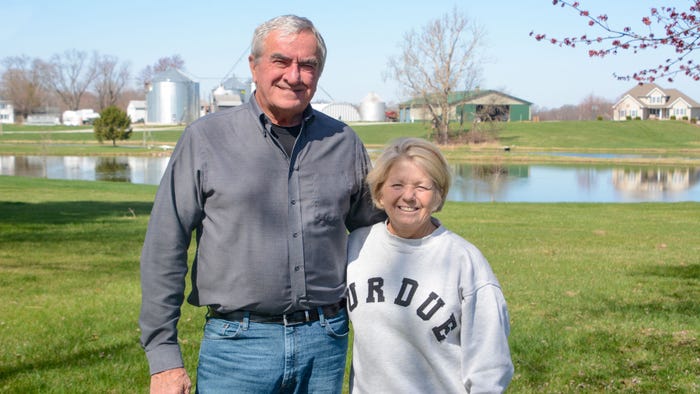
Everyone needs mentors. Outside of his father, George, Tom Schwenk of Rochester, Ind., looked up to his high school vocational-agriculture teacher, the late Si Deeb. Deeb’s daughter Connie says, “My dad had a philosophy that you do things so you can help others. He got the most happiness out of seeing other people’s success.”
Deeb passed that philosophy on to his students, especially Tom. Tom and his wife, Charlee, steadily expanded their farming operation, adding land and later bringing their son, Brock, into the business. As the farm grew, so did their ability to serve their community, and serving others is an important part of who they are today.
Growing steadily
Tom grew up helping his father, and after graduating from Purdue University in 1979, he returned to the farm. He also began renting some land on 50-50 shares.
If you could pick when to start farming in the last 100 years, 1979 wouldn’t rank high on the list — agriculture was coming off a high and headed for a sharp downturn. Being patient was an important quality, especially for someone getting established.
Tom and his father managed a 120-sow herd, selling feeder pigs, and still had a 6,000-hen layer flock. The chickens left first; then the hogs left in 1995.
“That was also when I took over for Dad,” Tom recalls. “Charlee and I bought land to grow the farm as we could. We were able to buy some farms which we had rented on 50-50 shares.”
Brock joined them over a decade ago. Today, Brock also manages a Beck’s seed dealership.
Eye on efficiency
Tom planted his first no-till soybeans with a Tye drill in 1988.
“We knew no-till would allow us to become more efficient with labor and machinery,” Tom says. “Today, we also run a Case IH vertical-tillage tool on some acres, normally not going deeper than 2 inches.
“The other thing no-till and vertical tillage do is help us protect soil resources. Sometimes no-till isn’t enough. We’ve also installed filter strips along ditches and grassed waterways in erodible areas.
“We’re aggressive with installing pattern tile too. We benefit in timeliness and yield, and it also reduces surface runoff, which helps limit soil erosion.”
The Schwenks embrace precision farming if it improves efficiency. They’ve employed grid soil sampling for 20 years and create variable-rate fertilizer prescription maps.
All their equipment is equipped with autoguidance. They rely on both a yield monitor and grain cart scales to enhance record-keeping.
Master Farmer at a glance
Age: 67
Location: Rochester, Fulton County, Ind.
Beginning: Tom Schwenk grew up helping his dad, George, on the farm. After graduating from Purdue in 1979, he returned home, also renting some land on his own on 50-50 shares. Tom married Charlee, a career teacher whom he met at Purdue, in 1982. Tom and his dad farrowed 120 sows and sold feeder pigs, discontinuing hogs in 1995. He bought out his dad the same year. He purchased land as he could afford it. Their son, Brock, joined the farm in the 2010s.
Farm today: The Schwenks raise corn and soybeans in no-till, sometimes using a Case IH vertical-tillage tool. They adopted grid soil sampling and variable-rate fertilizer application to remain efficient. They are aggressive at pattern tiling.
Family: Their children are Brock Schwenk and wife Tasha; and Abby, a teacher, and Brad Fitzgerald, West Lafayette, Ind. They have three grandchildren.
Employees: There are no full-time employees outside of family members.
Leadership: Tom served 22 years as a director on co-op boards, and currently serves on the board of Ceres Solutions. He also served 12 years on the Rochester School Board, including five years as president. He was a supervisor for the Fulton County Soil and Water Conservation District for 18 years, including serving as chairman. He served eight years on the Richland Township Advisory Board, and spearheaded building the Richland Township Community Hall as chairman of the building committee. Tom also served eight years on the local Farmer Home Administration loan committee.
Notable: The Schwenks maintain a wooden barn that is over 150 years old.
Read more about:
Master FarmersAbout the Author(s)
You May Also Like




